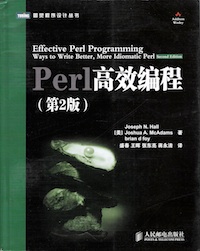I’ll be at OSCON on Tuesday, July 17, but you don’t have to find me to get up to 37% off Effective Perl Programming. That’s a slightly lower price than Amazon. To get that discount, you have to buy the book at Pearson’s booth in the exhibition hall. You’ll need to track me down on Tuesday afternoon or evening if you want me to sign your book.
If you can’t make it to OSCON, you can still get 35% off the cover price by ordering directly from the InformIT discount link or using the OSCON2012 discount code when you check out. Instead of navigating their site, you can go directly to our book.
If you’re not sure you want the book, you can look at a free sample chapter, which is also 35% off during OSCON.
 I mentioned a long time ago that
I mentioned a long time ago that